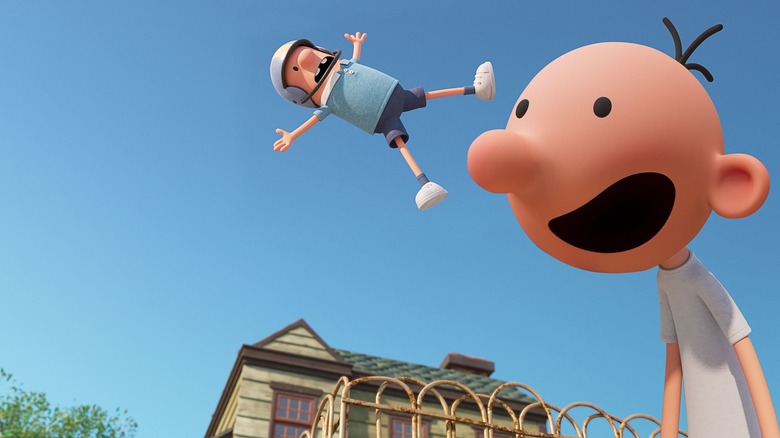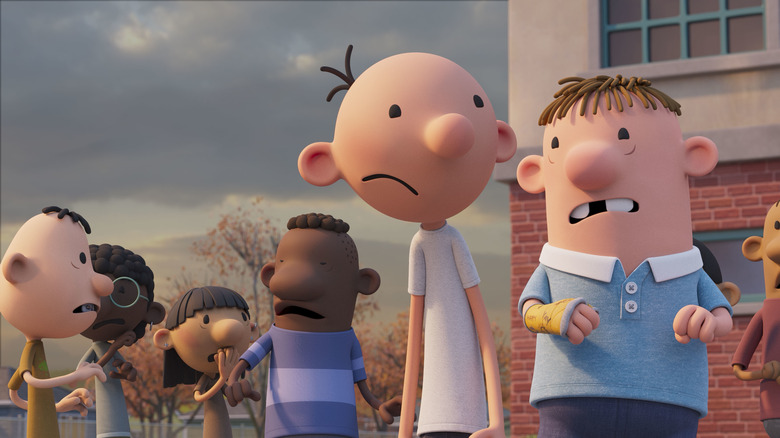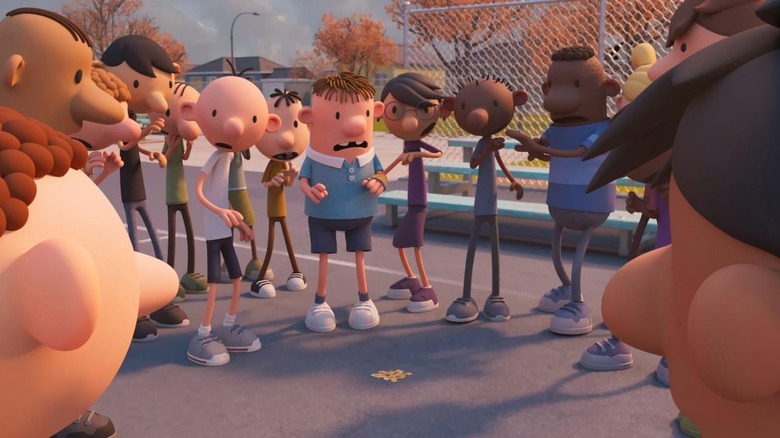Diary Of A Wimpy Kid's Creator Says Greg Isn't A Sociopath, He's Just A 12-Year-Old
Middle school is excruciating for everyone, but for many parents, Greg Heffley of the "Diary of a Wimpy Kid" series is a constant reminder of how difficult those formative years can be, and how the emotions of pre-teens can sometimes be as unexplainable as their decision making abilities. Based on Jeff Kinney's best-selling book series of the same name, Disney+ just debuted the new animated version of "Diary of a Wimpy Kid," centered around Greg, a middle child and the frequent target of bullying at school, which definitely influences his actions as a less-than-reliable narrator. Starring Brady Noon of "The Mighty Ducks: Game Changers," the new comedy is the latest addition to Kinney's 16 novels, a spin-off series, and four live action films.
Since the introduction of the series, parents have been pretty vocal about their dislike of Greg as the protagonist. To put it mildly, Greg isn't the poster-child for good behavior. He's indecisive, mischievous, lazy, paranoid, arrogant, dishonest, and frequently jealous of those around him. Most of his free time is spent playing video games, drawing comics, and playing with his best friend Rowley (Ethan William Childress of "Mixed-ish"), who is likely only his friend because they live close to each other in the same neighborhood. It's not often that children's entertainment are given antiheroes and unreliable narrators, and some parents have gone as far as denying their kids access to watch or read the series, calling Greg a "sociopath."
He's not a Sociopath, He's a Pre-Teen Anti-Hero
In a recent interview with ScreenRant, creator Jeff Kinney pushed back on detractors, defending the decision to not make Greg an idealized version of what parents wish kids were more like. "I think of Greg as just being a messy kid," Kinney said. "In fact, I think of him as being an accurate kid."
As someone who previously taught junior high school, Kinney is right. The pre-teen years are some of the hardest, where something as small as your friend asking you to come over and "play" instead of asking to "hang out" can turn you into the biggest loser in school. The social rules of middle school are arbitrary and constantly changing, so it makes total sense that Greg would be a ball of frustration, melodrama, and impulsivity. "A lot of things that Greg does and thinks? I did all those things," said Kinney. "And the people that criticize Greg for his behavior? I think they probably did a lot of those things, too." People also really, really need to stop armchair diagnosing fictional characters as "sociopaths," because ableism isn't a cute look on anyone, regardless if they're critiquing a fictional cartoon character.
Greg Is Great Representation, Actually
Children's media is frequently written from a perspective of educating children on the "correct" way to think an act, with all conflicts resolved nicely by the end of the story, and "problem children" learning a lesson and promising to never be or act a certain way ever again. Popular problem children like Junie B. Jones and even Arthur frequently perpetuate this cycle, whereas Greg is a kid whose story doesn't always wrap up cleanly at the end of the day. Kinney continued his defense stating:
Greg is recording his life at a time when he shouldn't be recording. It's right when he's not a fully formed person, and I think that people that give Greg a label are sort of missing the joke. Right off the bat, Greg says, "One day when I'm rich and famous, I won't have time to answer people's stupid questions." Whatever that is – I'm not sure how you label that – it's misguided. It's a little bit cocksure. But I don't think it's anything worse than that.
Children's entertainment sometimes sets up an unrealistic expectation for how children are supposed to behave, how they're supposed to feel, and what is the level of acceptability for how they react during conflict. Greg is a very real kid, and his existence can be incredibly validating for kids who feel like outsiders. Parents, instead of worrying about whether or not Greg is a "bad influence," open a dialogue with your kiddos about what's going on in their lives to make them relate to Greg so deeply, and be appreciative they can use "Diary of a Wimpy Kid" as a way to identify how they're feeling.


